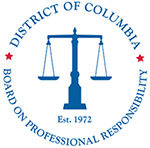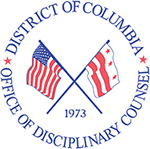- For the Public
- For Lawyers
- Board on Professional Responsibility
- Office of Disciplinary Counsel
- Disciplinary Decisions
-
Attorney Discipline News
- Administrative Order 2020-8: Live Streams of Hearing Committee Proceedings
- Administrative Order 2023-1: Return to In-Person Proceedings
- The Court of Appeals Makes Appointments to the Board on Professional Responsibility
- Amendments to the Rules of the Board on Professional Responsibility
- Amendments to the Rules of the Board on Professional Responsibility
- Volunteer Opportunities
From Washington Lawyer, June 2011
By Joe Perry
As of this writing, the Web site for Cromwell and Goodwin states that the firm has “a long tradition of pro bono and community activity,” and that the firm’s “commitment to being a responsible, ethical law firm is embedded throughout our organisation.”[1]
Such proclamations warm Bar Counsel’s heart. So you can imagine our alarm upon learning of reports that the law firm of Cromwell and Goodwin may not, in fact, exist.[2] Although the author (or authors) of the Web site claim that the firm originally was established in 1980, many in the legal community contend that they had not heard of the firm until mid-March of this year, when the Web site emerged. Attempted visits to the address listed as the firm’s headquarters in New York have not helped matters, because there is nothing there.[3] Calls to Cromwell’s managing partner about this and other issues apparently have gone unreturned.[4]
There is, of course, a very real concern that such a site could be used to perpetuate any number of frauds.[5] Beyond this, the idea that someone might create a bogus law firm to bring an air of legitimacy to fraudulent activities demonstrates some of the power, or at least the perceived power, in holding oneself out as an attorney. The D.C. Rules of Professional Conduct directly address such issues. Rule 7.1(a), regarding Communications Concerning a Lawyer’s Services, states:
A lawyer shall not make a false or misleading communication about the lawyer or the lawyer’s services. A communication is false or misleading if it:
- (1) Contains a material misrepresentation of fact or law, or omits a fact necessary to make the statement considered as a whole not materially misleading; or
- (2) Contains an assertion about the lawyer or the lawyer’s services that cannot be substantiated.
Rule 7.5 further incorporates these ideas into its proscriptions against misleading firm names, letterhead, and professional designations. Although most readers may readily identify the ethical issues inherent in advertising on behalf of a completely phony firm, other potential pitfalls abound.
For example, a solo practitioner may be able to use the word “firm” in reference to his solo practice—“The John Doe Law Firm”—but he may not use “John Doe & Associates,” as the latter necessarily implies the attorney is formally associated with other attorneys.[6] John Doe also may not state he is admitted to practice in a jurisdiction while he is on inactive status in that jurisdiction.[7]
Further, the requirement of truth in advertising applies not only to the composition and credentials of a practice, but to what the practice does. An attorney likely would run afoul of the ethical rules by stating in an advertisement, “I can help you when others can’t,” as such claims are incapable of substantiation.[8] Likewise, for the assertion: “I can help YOU!” The attorney who places this advertisement has no way of knowing who might be reading it, so she has no way of evaluating whether or not she actually has the capacity to help.[9]
There are limits, of course, to how strictly words will be interpreted. Attorneys who claim they are willing to “fight to the end” are generally excused from mortal combat, but those same attorneys should stand ready to carry their client’s case through multiple appeals.
There is no way to know what will have happened to Cromwell and Goodwin by the time this column makes it to print. Perhaps Mssrs. Cromwell and Goodwin will wake up one day to find there is no longer a demand for their legal services, despite the fact that, according to their Web site, Cromwell specializes in nearly every conceivable practice area.
Whatever Cromwell and Goodwin’s fate, however, the chatter surrounding their sudden emergence should serve as a reminder to all D.C. attorneys that the public is scrutinizing their advertising. Claims regarding qualifications and the like, whether made to solicit business, put the other side on notice, or for some other purpose, may be commonplace, but they must be made honestly. Bar Counsel encourages attorneys to review what this means for their practice.
Joe Perry is a senior staff attorney in the Office of Bar Counsel.
Notes
[1] The reader might find this spelling of “organisation” odd, as Cromwell and Goodwin is purportedly headquartered in New York.
[2] See, e.g., Baxter, B., What’s the Deal With Cromwell & Goodwin? http://amlawdaily.typepad.com/amlawdaily/2011/04/cromwell-goodwin.html (last visited Apr. 18, 2011).
[3] See id.
[4] See id.; Jones, A., On Cromwell & Goodwin: The World’s Most Mysterious Firm, Wall St. J., http://blogs.wsj.com/law/2011/04/11/on-cromwell-goodwin-the-worlds-most-mysterious-firm/ (last visited Apr. 18, 2011).
[5] In this regard, until the mystery surrounding Cromwell is resolved, lawyers are not encouraged to respond to the firm’s call for résumés, which reads as follows:
Do you want a challenging career with exceptional compensation and benefits and can give you a lifetime [of] professional development? You need not … go anywhere because Cromwell and Goodwin has more than something to offer you!
Aside from the inherent dangers of providing personal information to an organization that may not exist, Bar Counsel is concerned that the phrase “more than something” actually means “more than you bargained for.”
[6] See, e.g., Rule 7.1; Rule 7.5; D.C. Bar Legal Ethics Op. 332 (Firm Names for Solo Practitioners) (2005); D.C. Bar Legal Ethics Op. 189 (Name of Law Firm) (1988).
[7] See, e.g., Rule 7.1(a); D.C. Bar Legal Ethics Op. 271 (Inactive Members: Business Cards and Letterhead) (1997).
[8] See, e.g., Rule 7.1(a)(2); D.C. Bar Legal Ethics Op. 249 (Lawyer Advertising) (1994).
[9] See id.
Disciplinary Actions Taken by the District of Columbia Court of Appeals
Original Matters
IN RE Robert P. Kaufman. Bar No. 375715. March 10, 2011. The D.C. Court of Appeals publicly censured Kaufman in connection with his neglect of a client’s personal injury lawsuit. Rules 1.1(a), 1.3(a), 1.3(b)(1), 1.3(b)(2), 1.4(a), and 1.16(d).
Reciprocal Matters
In re John A. Elmendorf. Bar No. 454508. March 31, 2011. In a reciprocal matter from Maryland, the D.C. Court of Appeals disbarred Elmendorf. The Maryland Court of Appeals disbarred Elmendorf’s license by consent.
In re Jason M. Head. Bar No. 479171. March 31, 2011. In a reciprocal matter from Virginia, the D.C. Court of Appeals suspended Head for 50 days, subject to the conditions imposed in Virginia. The Virginia State Bar Disciplinary Board suspended Head for 20 days, and the Circuit Court of the City of Virginia Beach suspended Head for 30 days, to be followed by a one–year probationary period.
In re Maryrose O. Nwadike. Bar No. 455695. March 31, 2011. In a reciprocal matter from Maryland, the D.C. Court of Appeals imposed identical reciprocal discipline and disbarred Nwadike.
In re Sol Z. Rosen. Bar No. 10967. March 24, 2011. In a reciprocal matter from Virginia, the D.C. Court of Appeals disbarred Rosen. The Virginia State Bar Disciplinary Board revoked Rosen’s license to practice law by consent.
In re Michael J. Smith. Bar No. 432304. March 24, 2011. In a consolidated reciprocal matter involving multiple orders of discipline from Indiana, the D.C. Court of Appeals imposed functionally equivalent reciprocal discipline and suspended Smith for six months, with reinstatement contingent on a showing of fitness followed by an indefinite suspension with the right to petition for reinstatement after a period of five years or reinstatement by Indiana, whichever occurs first.
The Office of Disciplinary Counsel compiled the foregoing summaries of disciplinary actions. Informal Admonitions issued by Disciplinary Counsel and Reports and Recommendations issued by the Board on Professional Responsibility are posted at www.dcattorneydiscipline.org. Most board recommendations as to discipline are not final until considered by the court. Court opinions are printed in the Atlantic Reporter and also are available online for decisions issued since August 1998. To obtain a copy of a recent slip opinion, visit www.dccourts.gov/internet/opinionlocator.jsf.
- For the Public
- For Lawyers
- Board on Professional Responsibility
- Office of Disciplinary Counsel
- Disciplinary Decisions
-
Attorney Discipline News
- Administrative Order 2020-8: Live Streams of Hearing Committee Proceedings
- Administrative Order 2023-1: Return to In-Person Proceedings
- The Court of Appeals Makes Appointments to the Board on Professional Responsibility
- Amendments to the Rules of the Board on Professional Responsibility
- Amendments to the Rules of the Board on Professional Responsibility
- Volunteer Opportunities

- Board on Professional Responsibility
- 430 E Street NW
- Suite 138
- Washington, DC 20001
- Phone: 202-638-4290
- Fax:

- Office of Disciplinary Counsel
- District of Columbia Court of Appeals
- 515 5th Street, NW
- Building A, Suite 117, Washington, DC 20001
- Phone: 202-638-1501
- Fax: 202-638-0862

